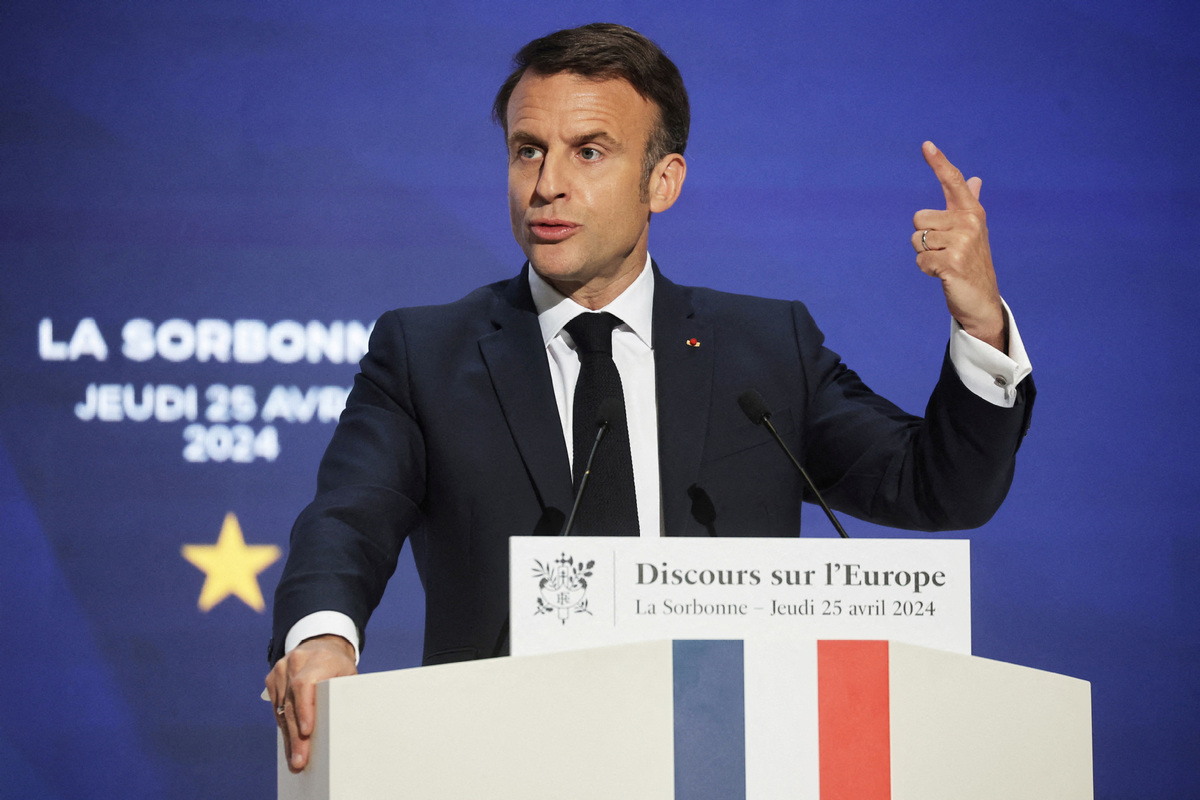
French President Emmanuel Macron delivers a speech on Europe in the amphitheatre of the Sorbonne University in Paris, France, 25 April 2024. [Photo/Agencies]
As the European Union grapples with multiple challenges, French President Emmanuel Macron's plea for the EU's strategic autonomy faces difficulty from divisions inside the bloc and probable intervention from the United States, experts say.
"There is a risk our Europe could die," Macron said at the Sorbonne University in Paris on Thursday. "We are not equipped to face the risks."
Macron is referring to the risk of EU fragmentation, as its internal unity has been greatly challenged by issues such as the Russia-Ukraine conflict, said Zhao Yongsheng, a professor at the Institute of Regional and International Studies at the University of International Business and Economics in Beijing.
"Decision-making within the bloc cannot guarantee benefits for all 27 members. Different countries with diverged interests have different policy inclinations. Especially on the Ukraine crisis, there are big divisions. Those near Ukraine are more proactive, compared with those in southern and western Europe," Zhao said.
"For example, the EU had granted duty-free import status to Ukrainian agricultural products, but it sparked protests among farmers in France and other agriculturally advanced nations."
Apart from calling for unity, Macron also appealed for stronger strategic autonomy, saying the continent "must show that it is never a vassal of the US and that it also knows how to talk to all the other regions of the world".
Macron has long called for "strategic EU autonomy" involving less reliance on the US and a more assertive EU on the global stage. Thursday's speech was billed by Macron's advisers as France's contribution to the EU's strategic agenda for the next five years.
"It's safe to say that Macron's words not only represent France, but also reflect the will of many EU member states," Zhao said.
"Europeans are increasingly seeking to be an independent global power, strategically distancing themselves from the US, as US strategies don't always align with the EU's interests. Macron's remarks implied that if France wants to deepen ties with China, the US should not interfere."
Wang Shuo, a professor at Beijing Foreign Studies University's School of International Relations and Diplomacy, said Europe, especially France, is not keen on sacrificing everything for the US, especially with current uncertainties in US politics and its increasingly "America first" approach.
However, while the EU advocating for strategic autonomy holds some significance, its substantive effect is limited, Zhao said, as autonomy needs to be backed by its own strength.
Significant setbacks
Wang said the bloc's push for its strategic autonomy has intensified because of the significant setbacks in its pursuit of this goal.
"The Russia-Ukraine conflict has significantly undermined Europe's strategic autonomy. The conflict has led to the long-term strained relationship between Europe and Russia, potentially necessitating its increased reliance on the US in the future," Wang said.
"Washington has taken advantage of the crisis, strengthening its grip on the West, and at a cost, increasing all allies' dependence on it. The US has actually profited greatly from this crisis, achieving both fame and fortune, while Europe, in many respects, may be the biggest loser next to Russia and Ukraine."
Although the EU has the will to push for strategic autonomy, it is rather difficult to achieve, he said.
"Even if Europe itself is united for that goal, the US will not allow it because an obedient Europe best serves the US' global strategy for world dominance," he said.
"Furthermore, it cannot be ignored that Europe does benefit from institutional dividends provided by the US. Severing ties with its top ally will not be an easy task."
Julian Shea in London contributed to this story.
yangran1@chinadaily.com.cn